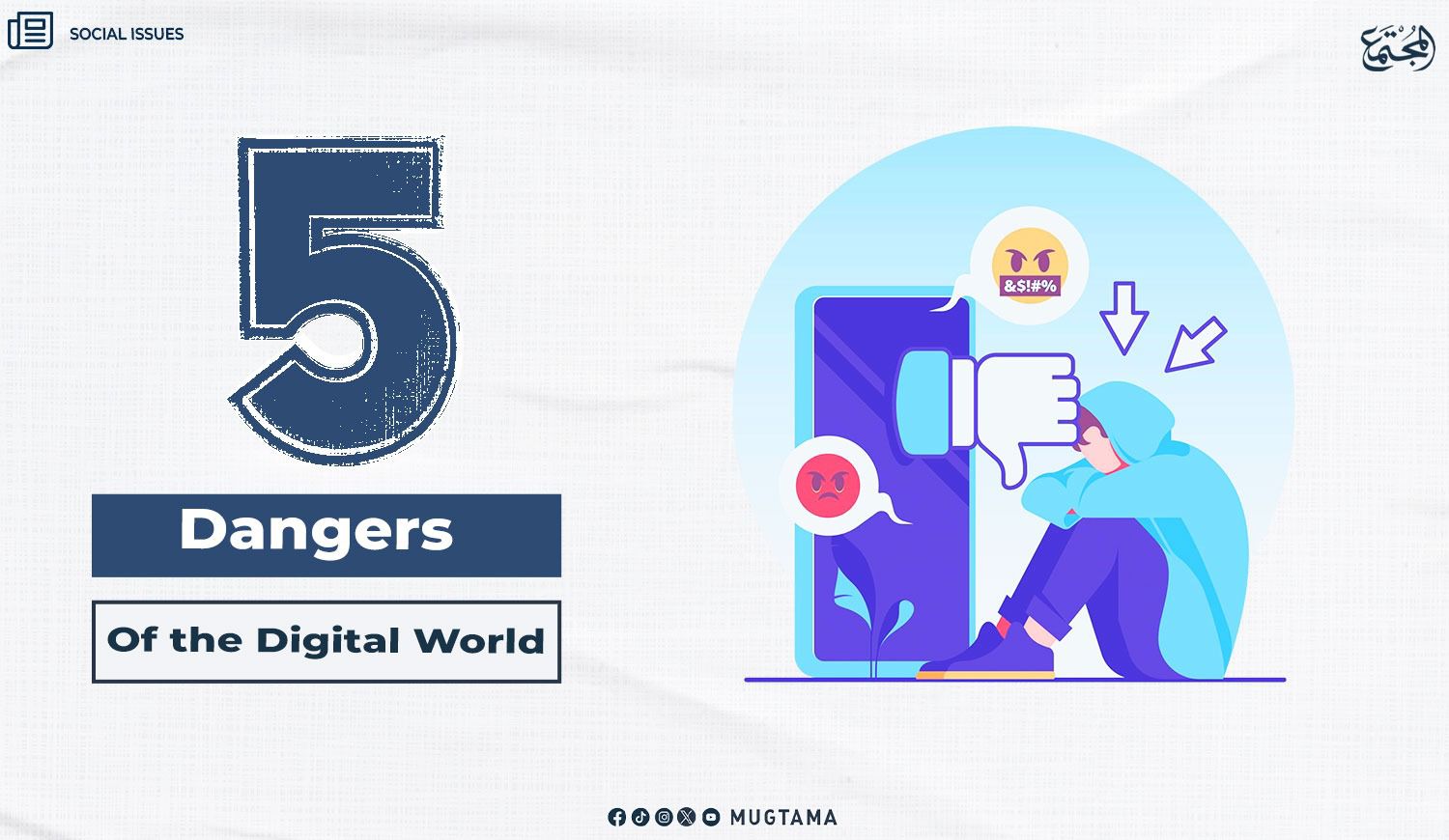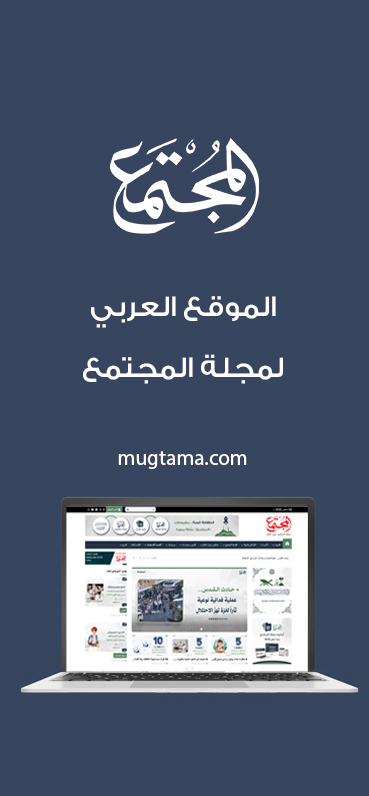5 Dangers of the Digital World

Man now stands at the threshold of a world
where steps accelerate, and the distance between continents shrinks to a mere
click— a new world called the digital world; a world with no walls to limit it,
no geography to restrict it, governed only by the threads of networks and
flashes of screens. A world that has captivated minds with its ease, and lured
hearts with its glitter, until it became accessible to the young and old, the
learned and ignorant, the righteous and corrupt alike.
This world, despite carrying treasures of
knowledge and means of connection and advancement, is not pure light nor
absolute good; rather, it is a double-edged sword. Just as it can be a bridge
for spreading the call to Allah, a platform for
knowledge, and a tool to bring people closer to the truth, it can also be a tool of destruction— sowing doubts,
feeding desires, eroding values, and consuming time. Its dangers manifest on
several levels:
1- Identity and Values:
The gravest threat the digital world poses
to our nation and generations is its subtle infiltration into the field of identity and values. Amid the flood of
images, packaged ideas, and ever-changing fashions, youth dissolve into
currents that leave nothing of their constants but ruins. They learn how to
appear before they learn how to be, and are fed foreign values that replace
modesty with display, diligence with frivolity, and belonging with a false
globalism that melts cultural and religious particularities into the crucible
of so-called “universality.”
Since values are not mere slogans but
guiding principles that govern behavior and build character, their absence in
the digital space means generations are raised without a compass, tossed by
waves of imitation, dragged by algorithms that know neither truth from
falsehood nor virtue from vice.
The Qur’an warned against following desires
without insight: “˹O
Prophet!˺ If you were to obey most of those on
earth, they would lead you away from Allah’s Way.
They follow nothing but assumptions and do nothing but lie.” (Al-An`am 6:116)
It is a soft war—no cannons are heard, yet
it wreaks devastation in the soul no less than any aggression, as it replaces
an authentic identity with an artificial one, planting in minds a sense of
estrangement from faith, nation, and society.
Information once kept within the walls of
one’s home is today a commodity bought and sold, stored in databases, analyzed
by algorithms that determine preferences, shape desires, and even manufacture
decisions without awareness. One’s image, voice, location, even simple
interests are no longer his own, but in the hands of companies and groups that
may use them rightly or exploit them. According to a 2024 Statista report, more
than 422 million people worldwide fell victim to digital identity theft in 2022
alone.
Between cyberattacks, digital espionage,
and leaks that may expose secrets and shake entities, man now lives in a
fragile space, where safety depends only on his awareness and caution. It is a
hidden war, without a bullet fired, yet capable of stealing an entire identity,
destroying major institutions, and unsettling entire nations.
3- Social Relationships:
The digital world was created to bring the
distant closer, but when misused, it distances the near! Families once gathered
at one table now see each member absorbed in his screen; friends once united in
gatherings now reduce their meetings to cold messages and silent emojis. Over
time, the warmth of feelings fades, human bonds weaken, and authentic
connection is replaced by virtual illusions.
A Harvard statistic shows that 36% of youth
feel lonely despite having hundreds of followers on social media. This is the
paradox of the digital age: a world crowded with noise, but with hearts
consumed by silence.
While one creates the illusion of
connection, he plants isolation within himself, surrounded by “followers,” yet
in reality closer to loneliness and emptiness.
4- Mental and Physical Health:
In the depths of digital immersion, man
pays a heavy price from his mental and physical health. Long nights before
screens steal sleep, addiction to browsing breeds anxiety and fuels depression,
and constant notifications scatter focus and weaken concentration. As for the
body, it suffers under long hours of sitting without movement, eyes strained by
continuous glare, and nerves tense with one alert after another.
The World Health Organization notes that
the rate of depression among heavy internet users is 20% higher than among
others, while prolonged sitting in front of screens increases the risk of heart
disease and obesity.
These consequences do not appear all at
once but accumulate silently, until the digital world shifts from being a tool
of comfort and leisure into a source of fatigue and weakness, stripping the
body of vitality and the soul of tranquility.
5- Exploitation of Crises:
When crises strike, and people seek
truthful news and life-saving information, the digital world often turns into a
field of chaos. Rumors spread like wildfire, people’s pains are exploited for
profit and influence, illusions are sold as reality, and lies are presented in
the guise of breaking news. The Qur’an described this with precision: “When you passed it from one tongue to the other, and
said with your mouths what you had no knowledge of, taking it lightly while it
is ˹extremely˺ serious
in the sight of Allah.” (An-Nur 24:15)
Even worse is when deviant groups or
malicious entities exploit these vulnerable moments to promote their
ideologies, recruit followers, and spread fear among societies.
The digital world is neither an absolute
enemy nor an absolute friend; it is an open arena where our minds and hearts
are tested. Whoever makes good use of it turns it into a bridge toward
knowledge and da‘wah, and whoever misuses it finds it a source of ruin. Allah
says: “So whoever does an atom’s weight of good
will see it. And whoever does an atom’s weight of evil will see it.” (Az-Zalzalah 99:7–8).
-------------------------------------------------------------
Resources:
-
International Institute of Islamic Thought
-
Yaqeen Institute: Muslim identity
-
Encyclopedia of “Mahasin Al-Islam”
-
Statista
-
Harvard Gazette
-
World Health Organization
Read Also:
-
Digital
Information Chaos and Filtering Solutions
-
Artificial
Intelligence: Evolution or Intellectual Invasion?











